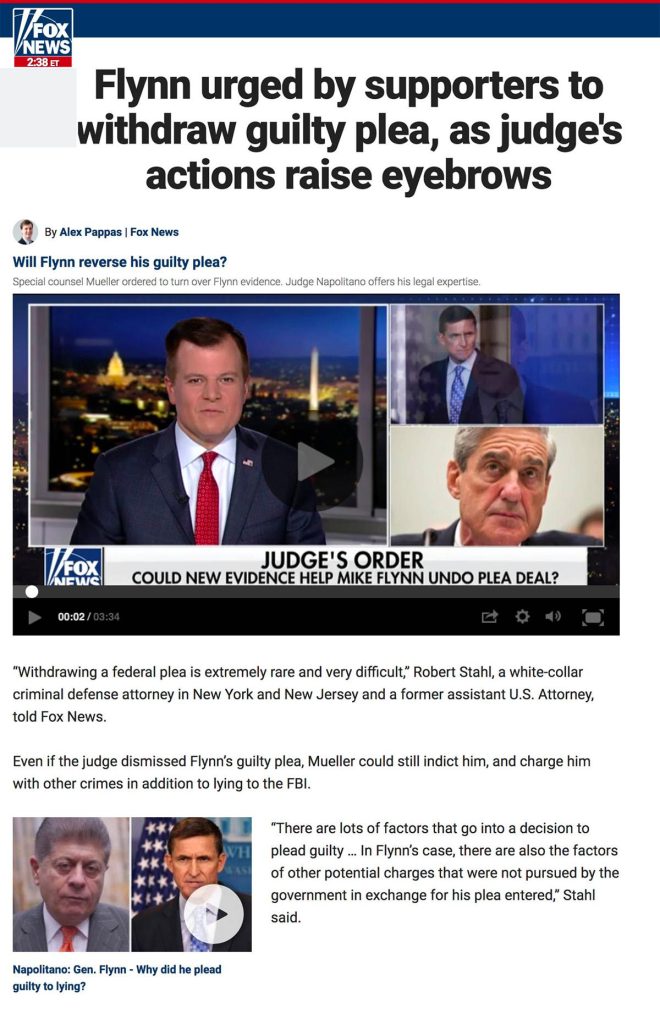Fox News Interviews Robert G. Stahl, Esq. on Plea Reversal for Gen. Michael Flynn

In coverage on Gen. Michael Flynn options for withdrawing a guilty plea in the Robert Mueller investigation, Fox News reached out to Attorney Robert Stahl for insights on plea reversals. In Alex Pappas’ Feb. 20, 2018 article, “Flynn urged by supporters to withdraw guilty plea as judge’s actions raise eyebrows,”, Robert Stahl was quoted as saying:
“Withdrawing a federal plea is extremely rare and very difficult.”
“There are lots of factors that go into a decision to plead guilty … In Flynn’s case, there are also the factors of other potential charges that were not pursued by the government in exchange for his plea entered.”
Robert Stahl adds to the article’s quoted text with more information regarding plea reversals.
At a Rule 11 plea hearing when the defendant enters a guilty plea, the Court goes through a great deal of informing and questioning of the defendant to make sure that the record is complete that he:
- Understands the nature of the charges and the potential exposure/consequences
- The right to trial and to confront witnesses
- The rights the defendant is waiving, including his right to remain silent
- That the defendant reads, writes and understands English
- That the defendant has taken no alcohol or drugs within the last 24 hours that would affect his ability to understand what is going on in court
- That the defendant has not been in a mental facility
- That the defendant has had sufficient time with defense counsel to discuss the facts, potential defenses, and the law
- The terms and scope of the plea agreement
- That the defendant is pleading guilty because he is in fact guilty
Then the Judge has the defendant establish the factual basis for the plea to demonstrate why he is guilty of the offense charged making sure that the factual allocution sufficiently satisfies the essential elements of the offense; and
Lastly, the Judge asks the government to proffer what additional facts the government would show to prove guilt.
All of the above prevents the defendant from coming back to court in an attempt to withdraw his plea based upon some alleged misunderstanding, that it was not voluntary or change of heart.
To withdraw a federal plea that has already been accepted under Rule 11(d)(2), the defendant would have to demonstrate a “fair and just” reason. The burden is on the defendant. To do so, the defendant must establish a legally cognizable defense and must show either an error in the taking of the plea or some more substantial reason that he failed to press the case rather than plead guilty.
Usually, courts refuse a motion to withdraw a plea if all of the above-listed Rule 11 advisements and questions have been followed. If a defect is found, then the court goes on to evaluate the defendant’s claim of innocence.
While there is a split in the federal circuit’s, the Judge in Flynn’s case has specifically noted that failure to provide material exculpatory evidence would provide grounds for the withdrawal of the plea. Even so, the move to withdraw the plea would be highly risky, and the withheld information must be “material.”
In Flynn’s case, simply because the government later turns over, pursuant to the Judge’s Standing Order, information that may be favorable to either guilt or sentencing, does not mean that the plea would be withdrawn. There are lots of factors that go into a decision to plead guilty. Many defendants and their attorneys believe that there are “triable” issues that would present a defense, but still choose to plead. The reasons are to limit one’s exposure to the number and types of charges; receive the benefit of a reduced sentence for pleading; and avoid other potential charges. There are also the factors of other potential charges that were not pursued by the government in exchange for his plea entered.
The articles and speculation about the information submitted to the FISA court, and the source of that information, leave out the fact that much more information was provided to the Judge, and that the re-ups of the warrant had to demonstrate that intercepts were being made of an evidential nature to justify the continued surveillance. So, even if there are proven misstatements and falsehoods, or that FBI agents initially believed Flynn was not intentionally lying, it would be difficult and risky to withdraw a plea.
Lastly, merely because the parties have worked out a protective order for the use of any such material does not mean a motion to withdraw the plea is being contemplated. Such information would also be valuable to any sentencing position Flynn’s side takes, as it could go to mitigation.
For all of the these reasons, the likelihood of success on a motion to withdraw the plea would be highly unlikely.
Over decades as a federal prosecutor and in private practice in New Jersey and New York, Mr. Stahl often has been quoted in print, and appeared in cable and network television and radio news. By drawing on his extensive experience in criminal investigations and trials, as well as his past position as an Assistant U.S. Attorney in the District of New Jersey, Robert Stahl addresses complex issues regarding white-collar crime, tax, and organized crime cases. In his role as an Assistant U.S. Attorney, Mr. Stahl successfully prosecuted multi-defendant, complex fraud cases with trials lasting as long as nine months, including the largest excise tax fraud case in the history of the United States.
Robert Stahl, and his firm, Stahl Gasiorowski Criminal Defense Lawyers aggressively defend individuals charged with complex federal and state crimes. Founder Robert G. Stahl is recognized as one of the top criminal defense attorneys in the NY/NJ area for his skills, knowledge and success. To contact us to discuss your case, call 908.301.9001 for our NJ office and 212.755.3300 for our NYC office, or email us at rgs@sgdefenselaw.com















